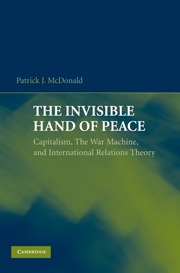Book contents
- Frontmatter
- Contents
- List of Tables
- Acknowledgments
- 1 American Grand Strategy and the Liberal Peace
- 2 Liberal International Relations Theory on War
- 3 Releasing the Invisible Hand
- 4 Liberal Economic Institutions and Peace in the Twentieth Century
- 5 Free Trade and Peace in the First Era of Globalization
- 6 From Rivalry to Friendship
- 7 The Achilles' Heel of Liberal International Relations Theory?
- 8 Peace Across the Taiwan Strait?
- 9 The Invisible Hand or the Ballot Box?
- 10 Capitalism and America's Peaceful Market Power
- References
- Index
6 - From Rivalry to Friendship
Published online by Cambridge University Press: 05 June 2012
- Frontmatter
- Contents
- List of Tables
- Acknowledgments
- 1 American Grand Strategy and the Liberal Peace
- 2 Liberal International Relations Theory on War
- 3 Releasing the Invisible Hand
- 4 Liberal Economic Institutions and Peace in the Twentieth Century
- 5 Free Trade and Peace in the First Era of Globalization
- 6 From Rivalry to Friendship
- 7 The Achilles' Heel of Liberal International Relations Theory?
- 8 Peace Across the Taiwan Strait?
- 9 The Invisible Hand or the Ballot Box?
- 10 Capitalism and America's Peaceful Market Power
- References
- Index
Summary
The nineteenth century witnessed a profound transformation in the political relationship between the existing and aspiring global superpowers of the era, Britain and the United States. It began with American efforts to remain aloof from European balance-of-power politics so that internal democratic reform could be safely consolidated. The Napoleonic Wars challenged this strategy of withdrawal as Britain and France both pressed for American support in their ongoing continental struggle for political supremacy. The United States quickly found itself at war again with its former imperial power.
The end of the War of 1812 failed to create the foundations for a lasting peace between the erstwhile imperial center and its political scion. Outstanding territorial disputes over the Oregon territory, the northeastern boundary that is present-day Maine, and in the Great Lakes region kept the possibility of war lurking throughout the first half of the century. The outbreak of the Civil War tempted Britain to intervene as the Northern embargo of the Southern cotton economy simultaneously endangered the industrial prowess of Britain. A final cathartic dispute over Venezuela in the 1890s, fueled partly by an American willingness to assume the responsibilities associated with the hemispheric supremacy implied by the Monroe Doctrine, ended with a stark and shared realization that war would be ruinous across both sides of the Atlantic. How were these political hazards continually navigated throughout this dynamic century so that the special relationship marked by conciliation, cooperation, and peace that endures today could emerge from one of rivalry, war, and economic competition?
- Type
- Chapter
- Information
- The Invisible Hand of PeaceCapitalism, the War Machine, and International Relations Theory, pp. 131 - 184Publisher: Cambridge University PressPrint publication year: 2009



